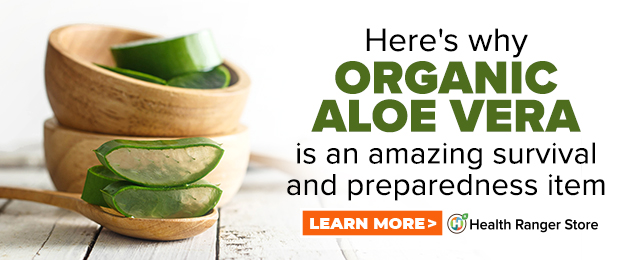
Are resilience and sustainability two sides of the same coin?
Saturday, February 09, 2013 by: Ellie Maclin
Tags: sustainability, resilience, growth
- Newly released JFK files reveal Pentagon's role in creating Lyme disease and covid in the same lab
- DEADLY DECEPTION: How COVID vaccines increased mortality rates and why authorities hid the truth
- CDC finally halts $11 billion COVID funding scam as health officials admit the ‘pandemic’ was a fraud
- The hidden dangers in your kitchen: How cooking methods impact diabetes, cancer and aging
- GAIN-OF-FUNCTION CAT-BIRD-FLU now on the rise as nearly a dozen cats in Colorado "test positive" for Bird Flu due to contaminated cat food
- Here are TEN all-natural ways to protect your garden without using harmful chemicals
- Trump's greatest betrayal so far: Accelerating Middle East wars, silencing dissent, and serving Zionist masters
- Why you should think twice before buying mainstream toothpaste formulas
- Ginseng's hidden anti-aging power: How compound K is rewriting the rules of skincare
- “Endgame: The Hidden Agenda 21” unveils a world of conspiracy and control
- ATTENTION PRESIDENT TRUMP: Please WITHDRAW your nomination of Dr. Susan Monarez for CDC Director as she is a VAX FANATIC and TOXIC JAB ZEALOT
- Was JFK's assassination orchestrated by a CIA double agent? New evidence points to James Angleton as the “architect”
- Home gardening for preppers: A beginner's guide to growing your own food
- Senate Democrats deny censorship industrial complex existed, defend government's role in silencing dissent
- Record honeybee deaths devastate U.S. agriculture, pesticides under scrutiny
- Paper or plastic? The environmental deception behind bag bans
- Scientists demand FDA withdraw mRNA COVID vaccines amid contamination and gene therapy concerns
- Lab leak confirmed? Boris Johnson's stunning reversal on COVID origins sparks global debate
- Newly released JFK files reveal Pentagon's role in creating Lyme disease and covid in the same lab
- Elon Musk: Aliens could be here on Earth RIGHT NOW
- Festive flavors: The sweet history, nutritional profile and health benefits of pecan pie
- Trump reverses course on Gaza plan, says “nobody is expelling Palestinians”
- Reclaim your health: How midlife exercise reverses years of inactivity
- Big Pharma's $8 Billion bribery scheme exposed: how doctors are pushed to prescribe junk science, not heal
- Boys are back in town: Trump’s patriotic alpha crew takes the wheel while toxic females ride in the backseat
- EPA advisor admits the agency is funneling billions to climate groups ahead of Trump’s return to White House
- Space war brewing? Russia threatens to destroy Starlink satellites
- Survival 101: Effective EMF blocking techniques
- A lack of integrity in Academia: Harvard professor found GUILTY of fraudulent research to promote CRT theory
- Mike Adams Sermon 66: God will DESTROY ISRAEL for its wickedness
- 5 Simple steps to boost your brainpower: How to strengthen executive function in a distracted world
- Rep. Nancy Mace introduces bill to ban biological males from female facilities on federal property
- Sugarcane extract superior to cholesterol-lowering drugs?
- WHO focusing more on policing speech about public health and implementing global surveillance systems
- Pilots report mysterious lights 'moving at extreme speeds' across Oregon skies
- Dr. Mike Yeadon releases 15-minute testimony - WATCH - about genocidal intent of COVID “vaccines”
- EPA advisor admits the agency is funneling billions to climate groups ahead of Trump’s return to White House
- The Health Ranger releases “Vaccine Zombie” song and music video, using AI-animated zombies for the music video
- California's social media censorship law struck down: A victory for free speech or a threat to online safety?
- Dr. Mike Yeadon releases 15-minute testimony - WATCH - about genocidal intent of COVID “vaccines”
- The pandemic as a tool for INDOCTRINATION: Understanding “The Indoctrinated Brain” by Dr. Michael Nehls
- Florida takes a stand: DeSantis proposes permanent ban on mRNA vaccine mandates
- Mike Adams releases country western hit single: Goin’ Back in Time is Comin’ Home
- Mike Adams releases music poetry sensation: A Child of God
- “Why we influenced the 2020 elections”: Facebook files reveal the coordinated effort to bury the Hunter Biden laptop story
- RFK Jr. clears key hurdle: Sen. Susan Collins backs controversial HHS nominee, signaling a new era for health policy
- Unpacking the Lies That We’ve Been Fed – new song and music video released by Mike Adams, the Health Ranger
- Mike Adams releases new song and music video: Nothing More Disgusting Than a Globalist
- Newly released JFK files reveal Pentagon's role in creating Lyme disease and covid in the same lab
- Congratulations to the FULLY UNVACCINATED as you resisted the COVID-19 PROPAGANDA MACHINE fueled by over $100 BILLION
- Michigan sheriff announces criminal investigation into 2020 election crimes, Dominion Voting Systems
- Israeli soldiers accused of even more torture and abuse in the West Bank
- Migrants are taking advantage of recent hurricanes to scam residents and loot their homes
- House Intelligence Committee calls for the ARREST and PROSECUTION of Dr. Anthony Fauci
- Red Cross issues warning to stop blood plasma donations from vaccinated people
- Scientists confirm: GENIUS brain function can be spontaneously unleashed in humans without any apparent cause
- EPA advisor admits the agency is funneling billions to climate groups ahead of Trump’s return to White House
- HYSSOP: What research reveals about the health benefits of this ancient holy herb
- Two containers with completed ballots fall out of truck in Florida
- Fully vaccinated about to see “tsunami” of illness and death, warns virologist
- Global leaders unite to clamp down on “misinformation” with UN-backed Cascais Declaration
- BREAKING: 2025 NDAA authorizes mandatory military draft of WOMEN across America… as Pentagon pursues global NUCLEAR war with both Russia and China at the same time
- Michael Yon warns of a ZIONIST TAKEOVER in Trump’s second administration
- BOMBSHELL: DNA testing kits are a SCAM to develop ethnic-specific bioweapons
- Ozempic and Wegovy weight loss drugs are injectable LIZARD VENOM PEPTIDES that may unleash a devastating wave of organ failure… side effects align with symptoms of SNAKE BITES
- Israeli soldiers accused of even more torture and abuse in the West Bank
- These 13 countries just signed an agreement to engineer a global FAMINE by destroying food supply
- NASA admits that climate change occurs because of changes in Earth’s solar orbit, and NOT because of SUVs and fossil fuels
- RFK Jr. clears key hurdle: Sen. Susan Collins backs controversial HHS nominee, signaling a new era for health policy
- Sermon 30: How Jesus reveals Caesar’s FAKE CURRENCY and FALSE AUTHORITY
- Coriander seeds: Ancient medicine backed by modern science
- Arizona officials claim Maricopa County needs 10-13 days to tabulate results of the election
Sustainable development?
In 2012, the United Nations issued The Report of the United Nations Secretary-General's High-Level Plan on Global Sustainability, entitled "Resilient People, Resilient Planet: A Future Worth Choosing." The report emphasizes the concept of "sustainable development" to ensure a prosperous future for the planet. In a nutshell, the thought behind sustainable development is that with the proper engineering, knowledge, and organization, we can continue to grow the world's economies using strategies that protect the environment.But as Robert Daniels writes in a 2012 paper presented at the at the European Association of Social Anthropologists in 2008 (and revised in 2010), "until we stop pumping oil, mining coal, cutting down forests, paving roads, and generating radioactive waste, the concept strikes me as a dangerously delusional fantasy."
Sustainable development vs. sustainable "degrowth"
A newer train of thought gaining credence among experts and activists is the idea of "degrowth" (roughly - and somewhat problematically - translated from the French decroissance). For those advocating sustainable degrowth, our current technological and economic systems are built on growth that never ceases, never levels off... and that kind of growth can never be sustained indefinitely. Our "infinite growth" industries are built on finite resources, and even alternative or renewable energy sources can't keep up with our current pace of growth forever. Or even for very long.Instead, advocates of degrowth suggest that we acknowledge the reality of a time in the near future when we cannot support even our current level of international "development" with the natural resources our planet has to offer. Instead of pushing to create an energy infrastructure that can somehow sustain the unsustainable, "rather it is how we deal with the consequences of not having the energy and other resources to maintain those same systems" (according to David Korowicz in a 2010 paper, "Tipping Point: Near-Term Systemic Implications of a Peak in Global Oil Production - An Outline Review").
Resilience and sustainability
This is a bit of a simplification, but in general, both camps - those who advocate for sustainable growth and those who believe policy and R & E funds should be going toward sustainable degrowth options - emphasize the concept of "resilience" as a key to finding sustainable, long-term solutions to our major social, political, economic, and ecological problems.A resilient system is able to bounce back from adversity, partially through fail-safe mechanisms that create ways to manage crisis situations. A sustainable system, as it's currently cast, is an increasingly efficient system that saves energy and thus money while protecting the environment - almost as a byproduct. (For a nice treatment, check out David Biello's October 2012 article in Slate magazine.)
The means to make a system more resilient aren't always sustainable. Biello uses the example of cities that build in diesel generators as backup in cases of power failure. More resilient, yes - but that diesel isn't exactly the sustainable energy of the future.
There are ways to yoke sustainability and resilience to the same cart. And doing so may be the key to capturing the public imagination - and the political legs to make it real. In another Slate article, Tori Bosch wrote, "Resilience requires seemingly disparate fields - fiscal policy, national security, environmental protection, infrastructure - to work together to create robust systems." It's up to this generation to build systems that are both sustainable and resilient, within this planet's means.
As Gandhi once said, "Earth provides enough to satisfy every man's need, but not every man's greed."
Sources for this article include:
http://www.unc.edu/~rdaniels/
http://www.slate.com
http://www.slate.com
About the author:
Ellie Maclin is a writer and sustainable farmer with a love of all things handmade--food, tools, clothing, children... She has a B.A. with Honors from UNC-CH and a M.S. in Archaeological Resource Management from UGA.
Ellie writes for PlushBeds, Earth and
Economy, Natural Awakenings Memphis, and several online writers' co-ops. She also runs a small sustainable farming operation with her husband, providing vegetables on a subscription agriculture model and pork on a hog-share basis.
She lives and works with her husband and daughter on a historic family farm near Memphis, TN, in a farmhouse that was constructed starting in 1832. She is a "green living" specialist with experience in permaculture, organic farming, humane animal husbandry, ecology, anthropology, and the long view of human history on the agricultural landscape.
Sustainability at FETCH.news
Get independent news alerts on natural cures, food lab tests, cannabis medicine, science, robotics, drones, privacy and more.
Take Action: Support Natural News by linking to this article from your website
Permalink to this article:
Embed article link: (copy HTML code below):
Reprinting this article:
Non-commercial use OK, cite NaturalNews.com with clickable link.
Follow Natural News on Facebook, Twitter, Google Plus, and Pinterest
Science News & Studies
Medicine News and Information
Food News & Studies
Health News & Studies
Herbs News & Information
Pollution News & Studies
Cancer News & Studies
Climate News & Studies
Survival News & Information
Gear News & Information
News covering technology, stocks, hackers, and more



"Big Tech and mainstream media are constantly trying to silence the independent voices that dare to bring you the truth about toxic food ingredients, dangerous medications and the failed, fraudulent science of the profit-driven medical establishment.
Email is one of the best ways to make sure you stay informed, without the censorship of the tech giants (Google, Apple, Facebook, Twitter, YouTube, etc.). Stay informed and you'll even likely learn information that may help save your own life."
–The Health Ranger, Mike Adams












































